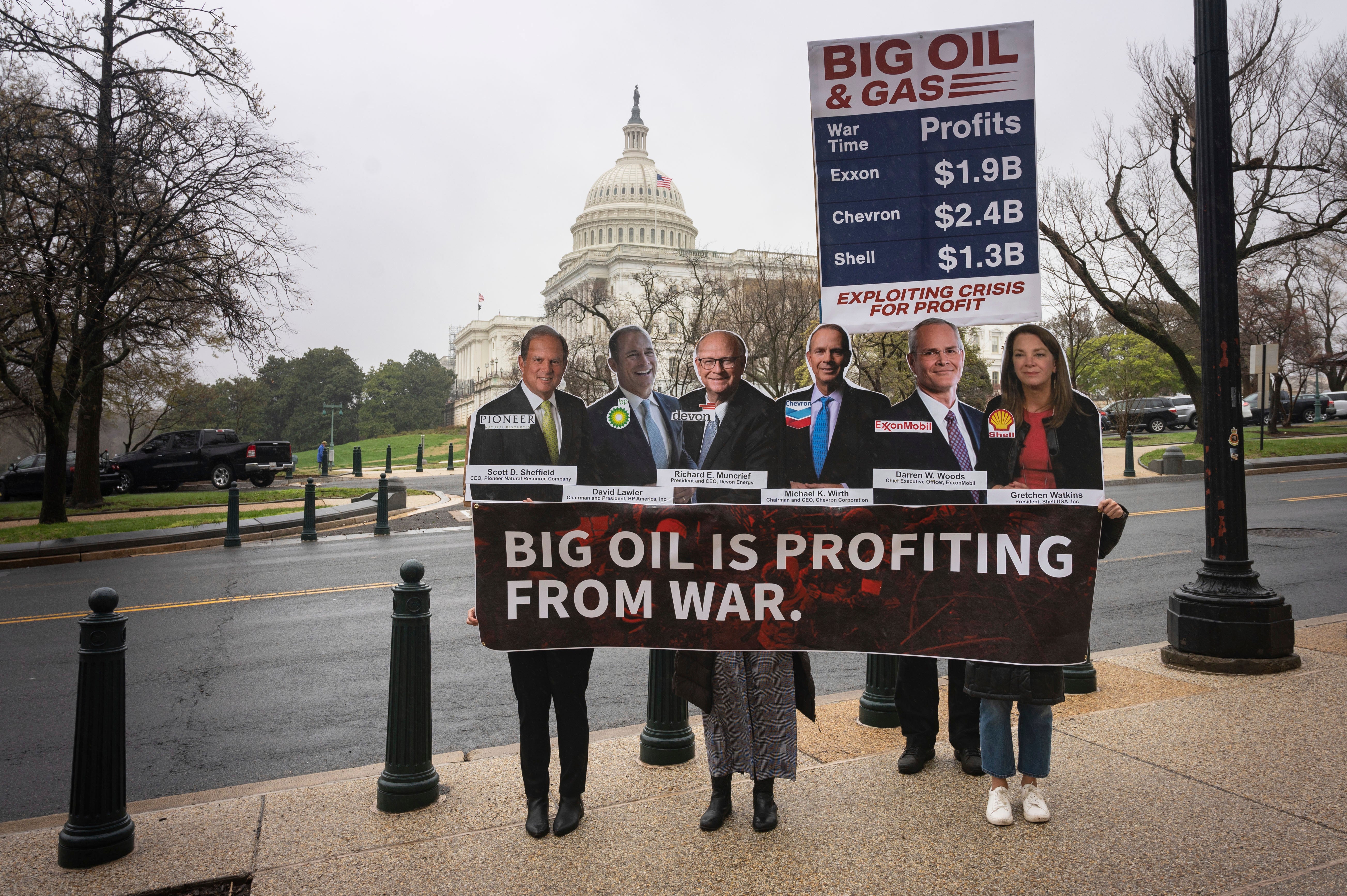Big Oil companies want you to know they’re the real victims here
Republicans really earned those campaign contributions this week


Your support helps us to tell the story
From reproductive rights to climate change to Big Tech, The Independent is on the ground when the story is developing. Whether it's investigating the financials of Elon Musk's pro-Trump PAC or producing our latest documentary, 'The A Word', which shines a light on the American women fighting for reproductive rights, we know how important it is to parse out the facts from the messaging.
At such a critical moment in US history, we need reporters on the ground. Your donation allows us to keep sending journalists to speak to both sides of the story.
The Independent is trusted by Americans across the entire political spectrum. And unlike many other quality news outlets, we choose not to lock Americans out of our reporting and analysis with paywalls. We believe quality journalism should be available to everyone, paid for by those who can afford it.
Your support makes all the difference.You should feel bad for Big Oil. Here they are just trying to make a quick buck (or $75 billion, as the case may be) and you have the audacity to connect the dots between their massive profits and the high prices you’re paying at the pump? How dare you.
Instead of playing the “blame game,” we should really be helping Big Oil do what they do best: producing more fossil fuels that destroy our climate. Maybe we could increase their subsidies? Give them more public land to drill on, even though they’re sitting on 9,000 unused drilling permits? How about ending all environmental reviews for new projects? At the very least, President Biden should stop talking about the need to transition to clean energy, because scary words like those could have a “chilling effect” on these multi-billion dollar companies.
Those were just some of the ideas recently offered up by Republicans, who did everything they could during Wednesday’s Congressional hearing on high gas prices to earn the roughly $370,000 that Big Oil has donated to their political campaigns.
While Democrats accurately described the ways that Big Oil companies have taken advantage of the war in Ukraine by intentionally restricting production in order to raise prices and increase their profits, Republicans whipped themselves into a frenzy trying to blame the Biden administration’s yet-to-be-implemented climate policies for the price hikes.
Never mind that oil company CEOs have repeatedly told their shareholders and federal regulators that it’s pressure from investors to juice their profits, not environmental regulations, that is holding back production and increasing prices. Facts like those were irrelevant for the GOP members of the committee, who were happier scaremongering about how today’s pain at the pump was a preview of the Green New Deal world to come (an especially odd argument considering that the Green New Deal would help us avoid paying for gas all together).
For their part, the oil CEOs were mostly happy to hide behind their GOP attack dogs and mumble about their commitments to energy, climate, stability, and whatever other buzzwords they thought would get Congress off their backs. We’ve known this would be their strategy ever since one of ExxonMobil’s top DC-lobbyists was caught on tape last June explaining how they used groups like the American Petroleum Institute as their “whipping boy” while pretending to be committed to climate action.
The one thing that did seem to ruffle the oil CEOs finely coiffed feathers were questions about the some $40 billion in stock buybacks they’re planning this year. Maybe that’s because they’ve seen the recent polling that suggests this is a particular source of outrage with voters across the political spectrum: a full 87 per cent of voters want politicians to crack down on oil industry price gouging and the support is particularly strong when buybacks are brought up. As Lukas Ross at Friends of the Earth told the Washington Post, the buybacks are a “master class in war profiteering” and the public is rightfully outraged.
When pressed on the point, ExxonMobil CEO Darren Woods tried to argue that his company’s stock buybacks and dividends were “a critical source of income for American families.” Being a billionaire himself, Woods may have forgotten that just 10 per cent of the wealthiest American families own 89 per cent of all US stocks and half the country doesn’t own any at all. Boosting Exxon’s share price might be good for the richest Americans, but it’s doing nothing to help alleviate pain at the pump.
What would provide immediate relief for American consumers is something a number of Democrats on the panel brought up: a windfall profits tax on Big Oil. As proposed in legislation introduced by Senator Sheldon Whitehouse and Representative Ro Khanna, a Big Oil Windfall Profits Tax would put a 50 per cent tax on every barrel of oil sold above the average price between 2015-2019, raising tens of billions of dollars that would be used to send checks to Americans struggling with high gas prices. With oil prices at their recent highs, Americans who make below $75,000 a year could expect a check for roughly $240.
That might not be a lot to a billionaire like Darren Woods, but it would go a long way to helping working families. It’s no wonder that 80 per cent of voters, including 73 per cent of Republicans, support the proposal and on Wednesday more than 120 consumer, taxpayer, climate, and faith organizations wrote Members of Congress urging them to pass the legislation.
As Wednesday’s hearing with the oil industry CEOs reminded us, we shouldn’t feel bad for Big Oil: we should make them pay.
Jamie Henn is the director of Fossil Free Media, which is running the Stop The Oil Profiteering (STOP) campaign to pass a Big Oil Windfall Profits Tax
Join our commenting forum
Join thought-provoking conversations, follow other Independent readers and see their replies
Comments